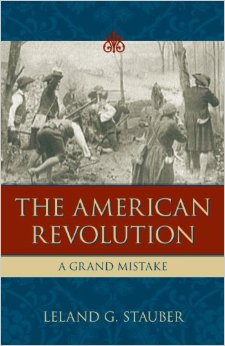Professor Stauber is not the first man I ever heard of who has suggested that the American Revolution was a mistake. Sigmund Freud thought that America herself was a mistake and made no distinction about the Revolution, but then he was a Sigmund-come-lately. And that makes Professor Stauber a Leland-come-lately, come to think of it. And that means that his thinking is inherently speculative, though it is not imaginative, or at least it is not imaginative enough.
Well, speculation can be fun or even funny, but for the professor it is neither. This is the most important thing to know about his book: It is so badly written that reading it is annoying in itself. I mean that all humor or irony is banished from the domain of Stauberthink, and there are some other promblems as well, or at least there are for me.
One of these is the one-sentence paragraph.
Another is the promblem of repetition. Another is the promblem of repetition.
And that wasn’t a one-sentence paragraph, however promblematical or repetitive it may have been as the repetition of a promblem, and however undeveloped it also may have been, as well and in addition. Furthermore.
Hopefully, I have not implied that stylistic matters are the only “promblem” (as I have heard the word pronounced) with the test. With the text. With the sex. Thoughtfully, that is not the case. Truthfully. Not at all. Far from it, in addition. Far be it from me.
Because really, when you get down to it, what the professor is saying is that the USA would have been better off as a Canadian-type deal. And that’s an interesting thought to my mind, particularly as Canada has produced so many notable comedians. But these same comedians came to prominence in the United States where the professor did not blossom as a comedian because he is an academic. And because he wants (wanted?) the USA to be more like Canada for a reason and that reason is not Canada but something else and you can probably guess what that is.
Guess what that is.
You guessed it. The professor wants the USA to have skipped the Revolution so that she would not—should not—had not . . . could not possibly have adopted the Constitution, because the Americans are neurotic about strong central government. Their government is hamstrung by its countervailing powers so that social issues cannot be addressed forcefully and conclusively. What social issues, you ask? I can’t hear you. WHAT SOCIAL ISSUES?
Slavery is one such issue, and strong central government would have produced a solution to the promblem. The Civil War would have not been required because, by 1833, the British Empire had dissolved the peculiar institution, though the professor neglects the issue of compensation to the slaveholders. You remember the compensation to the slaveholders. Of Jamaica. The British solution, contrary to the fantasy, would not have worked in the United States because there were so many slaves that compensation was an arithmetical impossibility. Not to mention a political impossibility, as the abolitionists were against any compensation whatsoever (by definition), and the slaveholders were not about to be told that their legal rights and institutions and even property were immoral or ungodly or whatever. They were c-c-c constitutional. That’s the promblem.
So the counterfactual engagement is fruitless, though certainly and increasingly America has produced many fruits. And this reminds me that the Revolution was “necessary” in the sense that the Union could not possibly have been fused much before it was, or much after. In that sense, the counterfactual is always pertinent, because nothing is inevitable except death and taxes.
The professor is, as it seems to me, barking up the wrong fruit tree. The United States doesn’t need a strong central government—she already has one. The U.S. government is committed forever, like a humorless, droning ideologue, to a path set long ago. That path has to do with making war on civilians and seeing a pillar of fire as a proof of virtue and God’s blessing. That path has to do with an endless series of Reconstructions, of social engineering projected on a global scale and magnified by bombing that produces shock and awe. The Constitution that so vexes the professor does not stop Washington from violating it routinely. Since the professor already has what he wants—an unaccountable, European-style Leviathan—his lack of imagination is all the more remarkable. He is a vigorous proponent or, as I may say, an athletic supporter of the Power State. He doesn’t need to think or even fantasize, so he doesn’t.
Thoughtfully, if he had, he could have looked at alternatives to the history of our relations with the “Indians.” And there, I do believe that the Crown had a better policy than the frontiersmen did. Hopefully, he could have looked at other cultural possibilities as well also, in addition. A Spanish alternative. And in addition an Hispanic one moreover. A French one—guillotines are so alluring for power freaks. What if the Louisiana Purchase had never happened, for example for instance? What if through Spanish, Hispanic, and French alliances, the culture had been more Catholic and less Protestant? And what if equality had been a radical priority at an earlier time? We would have needed more government to enforce more equality, and that would have been vitally exciting indeed.
This could be the start of something great. Could be, I said. The start.
[The American Revolution: A Grand Mistake, by Leland G. Stauber (Amherst, NY: Prometheus Books) 292 pp., $]

Leave a Reply